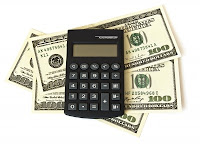Fortunately, these two goals are not mutually exclusively. There are numerous simple, yet environmentally-sound, things you can do at home which will also save money.
Become More Energy Efficient
The average U.S. home spends about $1,900 a year on energy costs, according to the U.S. Department of Energy.
Heating and cooling our homes and apartments often is the single largest expense on Americans' energy bills. Yet, plenty of energy can be wasted around the house - costing hundreds of dollars per year. To shave your energy costs, try these strategies:
* Lower your thermostat one degree (This simple step can save as much as 10% of your heating bill)
* Take shorter showers (This will cut your water and heating bills).
* Install a low-flow showerhead (These are cheap to buy and the energy and water savings you'll reap will quickly outmatch what you paid for the showerhead).
* Put a faucet aerator on each faucet (These are inexpensive to buy, yet do a great job of conserving heat and water, while simultaneously keeping water pressure high).
* Switch to compact fluorescent light bulbs (These often last longer and use less wattage than incandescent bulbs)
* Unplug appliances that aren't in use (Most people don't realize that just because you turn an appliance off, doesn't mean it's not still using power)
Use the 3 R's: Recycle, Reduce, Reuse
If you want to go green and save green, one way to accomplish both objectives is by remembering
"The 3 R's: Recycle, Reduce, Reuse."
This concept is all about diminishing our consumption of things we don't truly need - by using these we already have or finding alternative methods to satisfy our needs.
The point of "recycle, reduce, reuse" is to get all of us - individuals, businesses, municipalities and others - to use goods that are already manufactured rather than to keep using up the world's limited raw materials to make new or replacement goods.
So if I asked you whether you recycle, chances are those newspapers or plastic bottles in your home might spring to mind. But think beyond that. Consider also anything you might buy and bring home - from books to power tools - and then, consider borrowing instead of buying to reduce your consumption.
For instance, borrow reading materials from the library instead of buying books will not only save you money, it will also cut down on the ink and paper needed to print new books.
Also, instead of spending hundreds of dollars on big-ticket power tools, think about sharing these items or borrowing them from a neighbor, or perhaps renting such tools as needed from a local hardware store.
Speaking of power tools, let's say you cut your grass or you happen to be a gardener. You probably already know that composting helps improve soil so it holds more water and encourages plants to thrive.
But did you also know you could easily save big bucks on fertilizers and other additives? Just try this simple trick: Instead of throwing out food scraps and kitchen waste, toss them into a heap of compost - along with those grass clippings you cut. Just be careful to avoid composting things that can attract unwanted pests, such as meat, raw rice, bread or milk products, and cooking oil.
Limit Greenhouse Gas Emissions
It's not just big businesses that should be concerned about greenhouse gas emissions. So should individuals and families.
Sure, your household isn't some manufacturing plant that may be letting off gobs of emissions, but you may be unwittingly releasing more toxins into the environment than you realize - and costing yourself money in the process.
According to Columbia University, just tightening your windows you can tighten up your budget too. Experts from Columbia say that by having energy efficient windows, the average household would save $150 annually, and would reduce its carbon dioxide emissions by about 4,300 pounds per year.
Can't afford to replace those old drafty windows? A cheaper, easier tactic is to simply insulate your windows during the colder months using transparent film that keeps the heat in and the cold out.
Additionally, what about those heating ducts in your house? Experts estimate that if just one in 10 households used current technology to upgrade their inefficient heating systems, we could keep 17 billions pounds of pollution out of the air.
Another low-cost alternative here can provide a quick fix: Just get your heating vents and ducts cleaned regularly - and that will save you money and do your part for the environment too.
Whether you take small steps or big ones, realize that each one of us can help benefit the environment on a day-to-day basis. Doing so will not only make things better for future generations, it will also help your bank account today. Source
Join The Green Club

Share










No comments:
Post a Comment